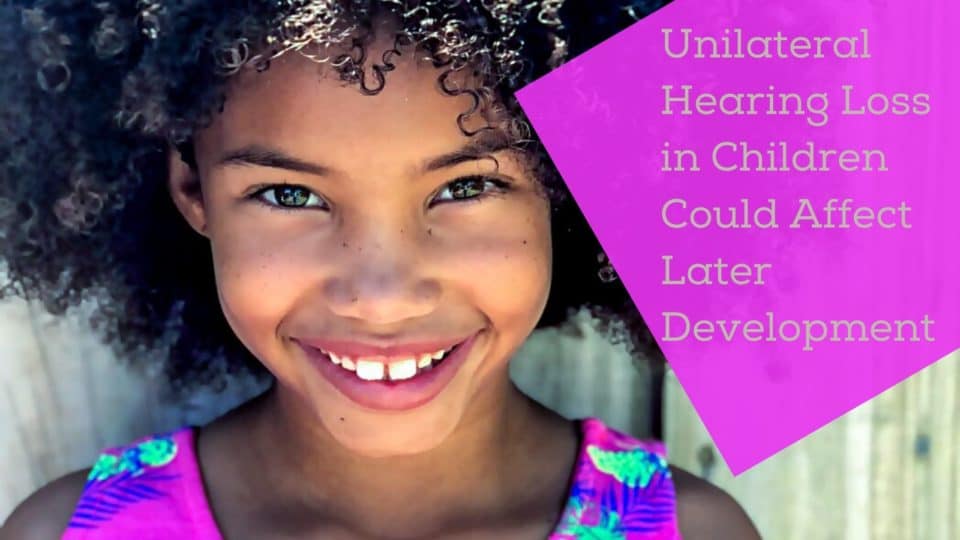- A Closer Look at Common Myths About Hearing Loss - May 7, 2024
- The Impact of Pets on Emotional and Hearing Health - April 26, 2024
- Strategies for Coping with Single-Sided Deafness - April 16, 2024
When children live with hearing impairments, it can a have significant impact on speech development, and learning. Congenial hearing loss refers to hearing loss present at birth. However, an acquired hearing loss, occurring can develop at any time after birth is often undiagnosed in children. When children can’t hear adults’ voices clearly it is sure to impact how soon they are able to learn to speak and absorb audio information. While many studies have documented the connection between hearing loss in infants and young children and the process of language acquisition, these studies have mainly tested for bilateral hearing loss. Bilateral hearing loss is the loss of hearing in both ears, however unilateral hearing loss (UHL) – a loss in one ear seems to have just as much of an impact.
Unilateral Hearing Loss
ULH happens when hearing is normal in one ear, while a hearing loss is present in the other and ranges from mild to very severe. UHL can occur in both adults and children. Approximately 1 out of every 1,000 children is born with UHL, and nearly 3% of school-age children have UHL. A recent study sought out to explore the impact of UHL on language acquisition and learning disabilities. The researchers suspected that because normal hearing is present in one ear, a UHL can often go undiagnosed – but what could account for learning difficulties when normal hearing is still present in one ear?
The Study on UHL and Language Acquisition
Published under the title “Early Prelingual Auditory Development of Infants and Toddlers with Unilateral Hearing Loss” in the journal Otology & Neurotology the study sought to better understand the effects of UHL on learning. Researchers at the Hearing Center at the West China Hospital of Sichuan University in China studies 167 children of three different types:
- 65 children with unilateral hearing loss,
- 32 children with bilateral mild hearing loss
- 70 children with normal hearing in both ears
The researchers led a comparative a comparative analysis of the speech development process for the of the children in all three groups from birth to age 3. At the end of the study researchers discovered that children with UHL and bilateral hearing loss both displayed issues with sound discrimination, sound identification, preverbal vocalization and early prelingual auditory development. Preverbal vocalization is the linking of sounds to speech development and is considered an advanced and ongoing process of auditory development. The researchers noted that all these issues suggested
speech pathology, also known as speech and langue issues, as they reached speaking age. While the researchers expected to find these issues exhibited in infants and children with bilateral hearing loss the discovery of this in the group with UHL left questions unanswered.
UHL and Speech Pathology
While grammatical and syntactic learning can be seen as a part of language acquisition, speech acquisition focuses on the development of speech perception and speech production over the first years of a child’s lifetime. The process of language acquisition is not as simple as mimicking the sounds that adults and other children make. It’s likely that it’s not the reduction of sound when living with UHL but perhaps something about how the brain balances sound with binaural hearing.
The Importance of Binaural Hearing
Binaural hearing is listening with both ears and besides amplifying sound it helps us identify the direction in which sound is coming from. with 360-degree range of sound inputs, binaural hearing provides better sense of balance and sound quality. A voice that is barely heard at 10 ft with one ear can be heard up to 40 ft with two ears. A person can hear sounds from a farther distance. This means that binaural hearing allows us to know where, how close and how fast a sound is traveling to us. It also allows us to single out a single voice in noisy room full of competing conversations. The researcher suspect that unilateral hearing loss can impede the understanding of complex sevenpences and contributes to listening fatigue which can impact learning and language acquisition
Childhood Hearing Loss
It’s important to monitor for hearing loss at any age. While it’s standard to test for hearing loss at birth, an infection or slight change in the ear canal can cause an impairment which can easily go undiagnosed for years. Even so the effects on learning can last a lifetime. To find out if your child may have a hearing loss, it’s important to scan regularly. Schedule a hearing test for your child today and give them all the advantages they need to learn and grow.

